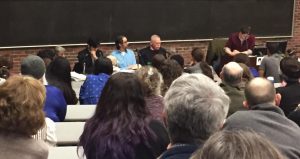This post, written by Dr, Gerald Benjamin, was originally published in Rockefeller Institute of Government’s blog. It is reposted here with permission.
After receiving a consultant’s report that the town’s highway garage was unsafe and near collapse, the governing board of the northeastern Onondaga County town of Cicero voted earlier this year to replace it. The estimated cost was $9,894,353. The decision had been avoided in the past, the need was great, leadership was willing, and the time seemed as ripe as it was likely to get. Town finances had been stabilized; Cicero is not among localities identified by the state comptroller as under “fiscal stress.” Interest rates are still low, especially for municipalities.
The plan was to borrow the money for the garage over 30 years. The average price for a house bought in Cicero in 2015 was $175,696. Without figuring in recent effects of changes in values, the annual tax impact of the project after the first year on this average priced house would come to $42 annually (about an initial 4 percent increase in a homeowner’s yearly town taxes). Things seemed all set. Continue reading




